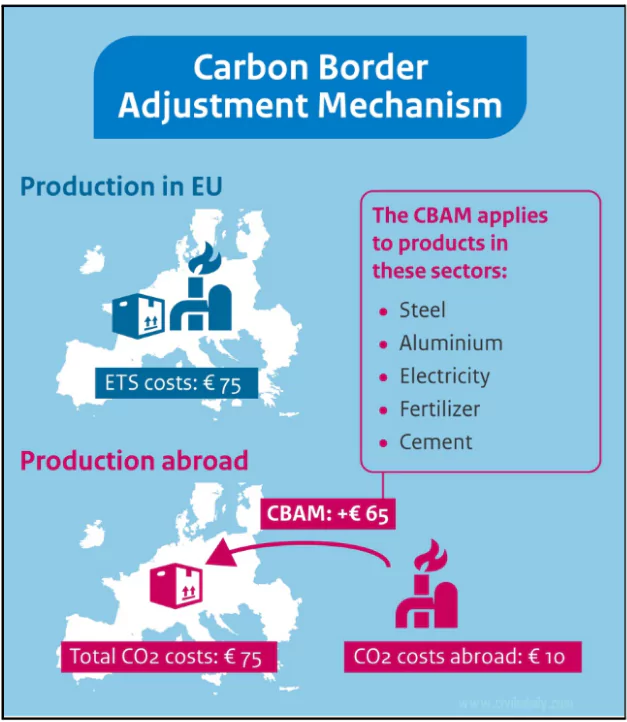China, representing the BASIC countries (Brazil, India, South Africa, and China), has submitted a request to the UNFCCC for discussions on “restrictive trade measures” such as Carbon Border Adjustment Mechanism (CBAM).
India and China’s Position at COP29
- Both nations, part of the BASIC group, submitted a formal request at COP29 to discuss climate-linked trade restrictions.
- They argue for a balanced approach that avoids economic discrimination while still addressing global climate goals.
- While the proposal was sidelined, the issue remains contentious and is expected to resurface in future discussions.
Enroll now for UPSC Online Course
About Carbon Border Adjustment Mechanism (CBAM)
| Aspect |
Details |
| Introduced By |
European Union (EU) in 2023. |
| Purpose |
- Prevent carbon leakage, where industries move to regions with weaker environmental standards to avoid emissions regulations.
- Encourage cleaner production practices globally.
|
| Target Goods |
- Taxes applied to imports with significant carbon emissions, including steel, cement, aluminum, and other energy-intensive goods.
|
| Legislative Framework |
- Part of the EU’s “Fit for 55 in 2030 package”, aiming to achieve a 55% reduction in GHG emissions by 2030 (compared to 1990 levels).
|
| Mechanism |
- Importers must surrender CBAM certificates annually, based on the declared carbon content of imported goods.
- Prices of certificates reflect the carbon cost, aligning with the EU’s carbon pricing under the Emissions Trading System (ETS).
|
| Applicability |
- Based on the actual declared carbon content of imported goods.
|
| EU’s ETS Connection |
- Works similarly to the EU-ETS, which sets a cap on permissible GHG emissions.
- Ensures a level playing field for EU industries subject to emissions regulations.
|
| Global Impact |
- Encourages countries exporting to the EU to adopt cleaner technologies.
- Influences global supply chains to factor in carbon costs.
|
Issues Regarding CBAM for Developing Nations

- Export Competitiveness: Developing countries, including India and China, argue that CBAM disproportionately harms their exports.
- Differentiated Responsibilities: CBAM overlooks the principle of “common but differentiated responsibilities” embedded in the Paris Agreement, which recognizes the differing capacities of nations to combat climate change.
- Economic Disadvantage: Developed nations have historically been major polluters and have transitioned to greener technologies over decades.
- Equipped with cleaner technologies, developed Countries will benefit from CBAM as their goods are less likely to be taxed, further marginalizing developing nations.
- Violation of Agreements: Developing nations argue that trade restrictions like CBAM violate international agreements such as the Paris Accord, which seeks to safeguard developing nations from the socio-economic impacts of climate response measures.
- Unilateral Actions: India, China, and others claim that unilateral measures like CBAM bypass the collaborative framework of global climate negotiations.
- They fear such measures could set a precedent for protectionism disguised as climate action.
Nearshoring and Reshoring
- Nearshoring: Relocating business processes or production to a nearby country, often within the same region.
- Example: US companies moving manufacturing operations to Mexico or Central America.
- Reshoring: Bringing business operations back to the home country.
- Example: European companies relocating production from Asia to Europe to reduce supply chain risks and improve quality control.
- Both nearshoring and reshoring are driven by factors like rising labour costs in traditional manufacturing hubs, geopolitical tensions, supply chain disruptions, and a growing emphasis on sustainability and local production.
|
Wider Implications of Climate-Related Trade Measures
- Accelerating Protectionism: CBAM and similar measures could lead to broader trade restrictions, disrupting global supply chains.
- Countries might adopt “nearshoring” or “reshoring” strategies, prioritising local production over global trade.
- Innovation and Environmental Standards: On the positive side, such measures might spur innovation in green technologies and enforce higher environmental standards globally.
- Disruptions in Global Trade: Increasing climate-induced natural disasters already pose risks to global supply chains.
- Trade measures linked to climate goals add to these disruptions, making international trade more uncertain.
- Potential Spillover: Other nations, including Canada and the UK, are considering their versions of CBAM, which could extend its impact on global trade.
Check Out UPSC CSE Books From PW Store
About BASIC Group
- Origin: Formed on 28th November 2009 by Brazil, South Africa, India, and China.
- Objective: To present a united front on climate change negotiations, particularly emphasizing the need for developed countries to take the lead in emissions reduction and provide financial support to developing countries.
- Key Role of BASIC at COPs:
- Played a crucial role in the Copenhagen Accord (2009), securing commitments from developed countries for climate finance.
- Successfully negotiated for the inclusion of key principles like equity, common but differentiated responsibilities, and respective capabilities in international climate agreements.
- Contributed to the Paris Agreement (2015) by pushing for ambitious climate action while safeguarding the interests of developing countries.
- Continuously advocates for a just and equitable global climate regime.
|
![]() 15 Nov 2024
15 Nov 2024

